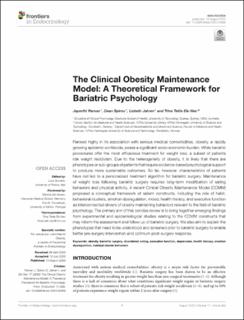| dc.contributor.author | Raman, Jayanthi | |
| dc.contributor.author | Spirou, Dean | |
| dc.contributor.author | Jahren, Lisbeth | |
| dc.contributor.author | Tetlie Eik-Nes, Trine | |
| dc.date.accessioned | 2022-05-10T10:58:24Z | |
| dc.date.available | 2022-05-10T10:58:24Z | |
| dc.date.created | 2020-07-23T17:48:28Z | |
| dc.date.issued | 2020 | |
| dc.identifier.citation | Frontiers in Endocrinology. 2020, 11 1-8. | en_US |
| dc.identifier.issn | 1664-2392 | |
| dc.identifier.uri | https://hdl.handle.net/11250/2995013 | |
| dc.description.abstract | Ranked highly in its association with serious medical comorbidities, obesity, a rapidly growing epidemic worldwide, poses a significant socio-economic burden. While bariatric procedures offer the most efficacious treatment for weight loss, a subset of patients risk weight recidivism. Due to the heterogeneity of obesity, it is likely that there are phenotypes or sub-groups of patients that require evidence-based psychological support to produce more sustainable outcomes. So far, however, characteristics of patients have not led to a personalized treatment algorithm for bariatric surgery. Maintenance of weight loss following bariatric surgery requires long-term modification of eating behaviors and physical activity. A recent Clinical Obesity Maintenance Model (COMM) proposed a conceptual framework of salient constructs, including the role of habit, behavioral clusters, emotion dysregulation, mood, health literacy, and executive function as interconnected drivers of obesity maintaining behaviors relevant to the field of bariatric psychology. The primary aim of this concise review is to bring together emerging findings from experimental and epidemiological studies relating to the COMM constructs that may inform the assessment and follow up of bariatric surgery. We also aim to explain the phenotypes that need to be understood and screened prior to bariatric surgery to enable better pre-surgery intervention and optimum post-surgery response. | en_US |
| dc.language.iso | eng | en_US |
| dc.publisher | Frontiers | en_US |
| dc.rights | Navngivelse 4.0 Internasjonal | * |
| dc.rights.uri | http://creativecommons.org/licenses/by/4.0/deed.no | * |
| dc.title | The Clinical Obesity Maintenance Model: A theoretical framework for bariatric psychology | en_US |
| dc.title.alternative | The Clinical Obesity Maintenance Model: A theoretical framework for bariatric psychology | en_US |
| dc.type | Peer reviewed | en_US |
| dc.type | Journal article | en_US |
| dc.description.version | publishedVersion | en_US |
| dc.source.pagenumber | 1-8 | en_US |
| dc.source.volume | 11 | en_US |
| dc.source.journal | Frontiers in Endocrinology | en_US |
| dc.identifier.doi | 10.3389/fendo.2020.00563 | |
| dc.identifier.cristin | 1820387 | |
| cristin.ispublished | true | |
| cristin.fulltext | original | |
| cristin.qualitycode | 1 | |

